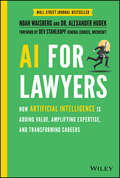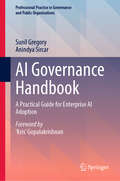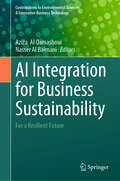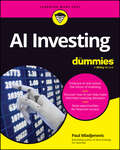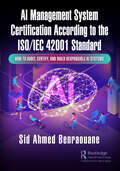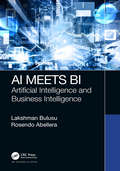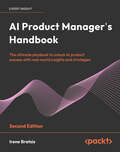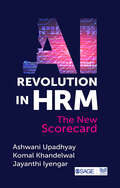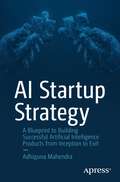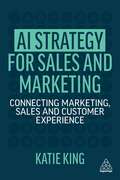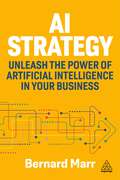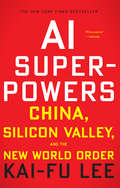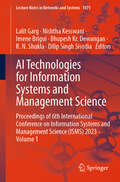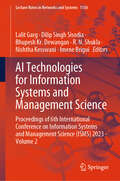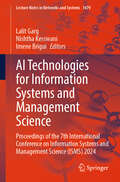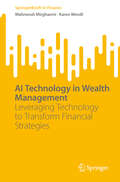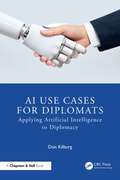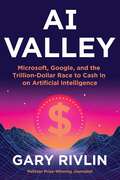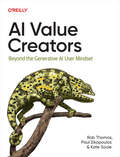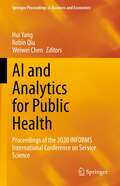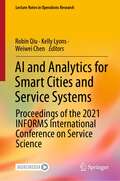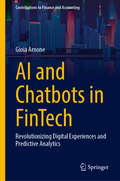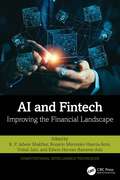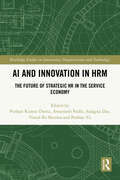- Table View
- List View
AI For Lawyers: How Artificial Intelligence is Adding Value, Amplifying Expertise, and Transforming Careers
by Noah Waisberg Alexander HudekDiscover how artificial intelligence can improve how your organization practices law with this compelling resource from the creators of one of the world’s leading legal AI platforms. AI for Lawyers: How Artificial Intelligence is Adding Value, Amplifying Expertise, and Transforming Careers explains how artificial intelligence can be used to revolutionize your organization’s operations. Noah Waisberg and Dr. Alexander Hudek, a lawyer and a computer science Ph.D. who lead prominent legal AI business Kira Systems, have written an approachable and insightful book that will help you transform how your firm functions. AI for Lawyers explains how artificial intelligence can help your law firm: Win more business and find more clients Better meet and exceed client expectations Find hidden efficiencies Better manage and eliminate risk Increase associate and partner engagement Whether focusing on small or big law, AI for Lawyers is perfect for any lawyer who either feels uneasy about how AI might change law or is looking to capitalize on the evolving practice. With contributions from experts in the fields of e-Discovery, legal research, expert systems, and litigation analytics, it also belongs on the bookshelf of anyone who’s interested in the intersection of law and technology.
AI Governance Handbook: A Practical Guide for Enterprise AI Adoption (Professional Practice in Governance and Public Organizations)
by Sunil Gregory Anindya SircarEnterprise AI represents a transformative moment in technology, empowering businesses to unlock the potential of data, automation, and advanced analytics. It drives innovation, streamlines operations, and amplifies competitiveness in an increasingly digital economy. Yet, as promising as this technology is, adopting Enterprise AI is no simple feat. It demands a strategic alignment of AI initiatives with organizational goals while addressing many complex risks and challenges. Businesses face a new frontier of operational dilemmas, from algorithmic bias and data privacy concerns to the legal and ethical quandaries of AI-generated content. Questions of accountability for AI actions, intellectual property rights, and the threat of data laundering or AI hallucinations further complicate the landscape. Amid these challenges, enterprises are tasked with navigating a "pre-regulatory era," where global authorities are racing to establish policies and frameworks for a trustworthy and lawful AI ecosystem. The AI Governance Handbook is a comprehensive guide tailored for stakeholders at the forefront of AI adoption—executives, managers, data scientists, engineers, and compliance professionals. This essential resource provides the knowledge, tools, and strategies to lead organizations through the complexities of implementing AI responsibly and effectively. Packed with actionable insights, the handbook explores critical topics such as aligning AI strategies with organizational objectives, managing ethical dilemmas, adhering to emerging regulations, and fostering transparency in AI operations. It offers readers a roadmap to build a resilient and dependable AI framework prioritizing fairness, accountability, and innovation.
AI Integration for Business Sustainability: For a Resilient Future (Contributions to Environmental Sciences & Innovative Business Technology)
by Aziza Al Qamashoui Nasser Al BaimaniThis book offers a comprehensive exploration of artificial intelligence (AI) integration for business sustainability for a resilient future. Delving into the dynamic interplay between AI and sustainable business practices, it serves as a vital guide for professionals, entrepreneurs, policymakers, and researchers seeking to embrace innovative solutions to drive sustainability initiatives forward. From its inception, the book sets out to showcase the critical role that AI plays in reshaping modern business landscapes towards sustainability. It extensively covers various facets with foundational understanding of sustainability and AI evolution and detailed insights into successful AI integration in industries such as agriculture, education, energy, manufacturing, and healthcare. Through real-world case studies and practical strategies, it illuminates how AI can optimize operations, mitigate environmental impact, and foster social responsibility. The book addresses the core challenges faced by businesses in implementing AI-driven sustainability solutions. It navigates through adoption barriers, regulatory concerns, and ethical considerations, offering actionable advice for responsible AI integration. Furthermore, it presents future trends and emerging technologies, empowering readers to anticipate disruptions and utilize innovative AI solutions.
AI Investing For Dummies
by Paul MladjenovicWinning strategies for investors looking to boost gains with artificial intelligence AI is one of the hottest investment trends on Wall Street. AI Investing For Dummies gives you all the must-know details on how artificial intelligence can benefit investors. You’ll learn how powerful AI can be in helping you make better decisions, identify hidden opportunities, and build wealth in stocks, bonds, commodities, and real estate. This easy-to-understand Dummies guide also covers budgeting, taxes, estates, and planning for college and retirement—all with AI-specific tactics that can improve efficiency, mitigate risk, and level up your portfolio’s performance. You’ll also find all the info you need to sift through and implement the right resources and solutions for you. Understand the benefits and drawbacks of AI investing Debunk the biggest myths about AI investing Get an in-depth analysis of the top AI stocks to watch Learn how to avoid common pitfalls in AI investing Take a peek at the role of AI in shaping the future of finance This is the ideal Dummies resource for consumers and investors who are new to AI and want to wrap their heads around this emerging technology.
AI Management System Certification According to the ISO/IEC 42001 Standard: How to Audit, Certify, and Build Responsible AI Systems
by Sid Ahmed BenraouaneThe book guides the reader through the auditing and compliance process of the newly released ISO Artificial Intelligence standard. It provides tools and best practices on how to put together an AI management system that is certifiable and sheds light on ethical and legal challenges business leaders struggle with to make their AI system comply with existing laws and regulations, and the ethical framework of the organization.The book is unique because it provides implementation guidance on the new certification and conformity assessment process required by the new ISO Standard on Artificial Intelligence (ISO 42001:2023 Artificial Intelligence Management System) published by ISO in August 2023. This is the first book that addresses this issue.As a member of the US/ISO team who participated in the drafting of this standard during the last 3 years, the author has direct knowledge and insights that are critical to the implementation of the standard. He explains the context of how to interpret ISO clauses, gives examples and guidelines, and provides best practices that help compliance managers and senior leadership understand how to put together the AI compliance system to certify their AI system. The reader will find in the book a complete guide to the certification process of AI systems and the conformity assessment required by the standard. It also provides guidance on how to read the new EU AI Act and some of the U.S. legislations, such as NYC Local Law 144, enacted in July 2023.This is the first book that helps the reader create an internal auditing program that enhances the company’s AI compliance framework. Generative AI has taken the world by storm, and currently, there is no international standard that provides guidance on how to put together a management system that helps business leaders address issues of AI governance, AI structure, AI risk, AI audit, and AI impact analysis. ISO/IEC 42001:2023 is the first international mandatory and certifiable standard that provides a comprehensive and well-integrated framework for the issue of AI governance. This book provides a step-by-step process on how to implement the standard so the AI system can pass the ISO accreditation process.
AI Meets BI: Artificial Intelligence and Business Intelligence
by Lakshman Bulusu Rosendo AbelleraWith the emergence of Artificial Intelligence (AI) in the business world, a new era of Business Intelligence (BI) has been ushered in to create real-world business solutions using analytics. BI developers and practitioners now have tools and technologies to create systems and solutions to guide effective decision making. Decisions can be made on the basis of more reliable and accurate information and intelligence, which can lead to valuable, actionable insights for business. Previously, BI professionals were stymied by bad or incomplete data, poorly architected solutions, or even just outright incapable systems or resources. With the advent of AI, BI has new possibilities for effectiveness. This is a long-awaited phase for practitioners and developers and, moreover, for executives and leaders relying on knowledgeable and intelligent decision making for their organizations. Beginning with an outline of the traditional methods for implementing BI in the enterprise and how BI has evolved into using self-service analytics, data discovery, and most recently AI, AI Meets BI first lays out the three typical architectures of the first, second, and third generations of BI. It then takes an in-depth look at various types of analytics and highlights how each of these can be implemented using AI-enabled algorithms and deep learning models. The crux of the book is four industry use cases. They describe how an enterprise can access, assess, and perform analytics on data by way of discovering data, defining key metrics that enable the same, defining governance rules, and activating metadata for AI/ML recommendations. Explaining the implementation specifics of each of these four use cases by way of using various AI-enabled machine learning and deep learning algorithms, this book provides complete code for each of the implementations, along with the output of the code, supplemented by visuals that aid in BI-enabled decision making. Concluding with a brief discussion of the cognitive computing aspects of AI, the book looks at future trends, including augmented analytics, automated and autonomous BI, and security and governance of AI-powered BI.
AI Product Manager's Handbook: The ultimate playbook to unlock AI product success with real-world insights and strategies
by Irene BratsisBlending strategic frameworks, real-world case studies, and cutting-edge AI insights, this guide equips product managers with the tools to navigate challenges, drive innovation, and build scalable, high-impact AI products.Key FeaturesGain insights into AI product discovery, market fit, and execution through structured frameworks.Learn to translate complex AI capabilities into real-world solutions that drive value.Understand ethical AI, bias mitigation, and compliance to build responsible AI products.Purchase of the print or Kindle book includes a free PDF eBook.Book DescriptionAI is rapidly transforming product management, presenting new challenges and business opportunities. As AI-driven solutions become more complex, product managers must bridge the gap between technological capabilities and business needs. This book provides a detailed roadmap for successfully building and maintaining AI-driven products, serving as an indispensable companion on your journey to becoming an effective AI product manager. In this second edition, you'll find fresh insights into generative AI, and responsible AI practices with the most relevant tools for building AI-powered products. Authored by a leading AI product expert with years of hands-on experience in developing and managing AI solutions, this guide translates complex AI concepts into actionable strategies. Whether you're an aspiring AI PM or an experienced professional, this book offers a structured approach to defining AI product vision, leveraging data effectively, and aligning AI with business objectives. With new case studies and refined frameworks, this edition provides deeper insights into ethical AI, cross-functional collaboration, and deployment challenges. By the end of this book, you’ll be equipped with the knowledge to drive AI product success with key techniques for identifying AI opportunities and managing risks in a rapidly evolving landscape.What you will learnPlan your AI PM roadmap and navigate your career with clarity and confidenceGain a foundational understanding of AI/ML capabilitiesAlign your product strategy, nurture your team, and navigate the ongoing challenges of cost, tech, compliance, and risk managementIdentify pitfalls and green flags for optimal commercializationSeparate hype from reality and identify quick wins for AI enablement and GenAIUnderstand how to develop and manage both native and evolving AI productsBenchmark product success from a holistic perspectiveWho this book is forThis book is tailored for aspiring and experienced product managers, AI strategists, and business leaders aiming to integrate AI into their products. A foundational understanding of AI is expected and reinforced throughout the book. It is particularly valuable for professionals looking to bridge AI and business strategy, optimize AI/ML applications, and drive data-informed decision-making. Engineers, designers, and executives seeking to align AI capabilities with user needs and market demands will also benefit from the insights and real-world case studies on building scalable AI products.
AI Revolution in HRM: The New Scorecard
by Ashwani Kumar Upadhyay Komal Khandelwal Jayanthi IyengarWith AI being touted as the new kid on the block, the HR function in organizations is witnessing a sea change with the advent of new data-driven analytical processes. Till now HR has been about employees already working within an organization and potential entrants to it. What happens when machines and bots enter the scene? AI Revolution in HRM is all about debunking the conventional wisdom and redrawing the contours of passé management to include machines into its definition. This book discusses the benefit, challenges and applications of AI in the HR function. It also highlights issues in implementation and considers the impact of AI-based HR systems in the organization. Further, the book provides tips and insights on how to deal with the challenges and implementation issues ranging from data privacy to system bias and up-skilling of current employees. It is builds on a wide variety of cases ranging from large global organizations to startups. This book will ensure that HR professionals and general readers fully understand the concepts of AI and its relevance to the HR profession. Equipped with the knowledge of AI-based tools and systems, it will help the HR department make their organizations more vibrant and stable by embracing the developments in AI technology. AI Revolution in HRM will be an insightful and helpful read for HR professionals and AI enthusiast.
AI Startup Strategy: A Blueprint to Building Successful Artificial Intelligence Products from Inception to Exit
by Adhiguna MahendraGain exclusive access to the secrets to building an enterprise AI start-up. AI innovation helps with every aspect of the business, from the supply chain, marketing, and advertising, customer service, risk management, operations to security. Industries from different verticals have been adopting AI and get real business values out of it. This book guides you through each step, from defining the business need and business model, all the way to registering IP and calculating your AI start-up valuation. You see how to perform market and technology validation, perform lean AI R&D, design AI architecture, AI product development and operationalization. The book also cover building and managing an AI team, along with attracting and keeping business and developer users,Building an Enterprise AI start-up is hard because Enterprise AI is an effort to build applications to mimic human intelligence to solve business problems. Hence it has a different challenge from building traditional non-AI applications, such as scouting, recruiting and managing AI talents; designing the most cost-efficient and scalable Enterprise AI; or establishing the best practice to operationalize AI in productionAs we are in the dawn of the AI-first product wave, AI-powered products for enterprises will be created for many years to come and AI Startup Strategy is the one-stop guide for it.What You'll LearnMatch customer’s expectation VS technical feasibilityJustify business values and ROI for customersReview the best business models for high valuation enterprise AI start-upsDesign an AI product that gives a satisfactory experience for the userRegister and value AI IP Who This Book is For Startup Founders, Product Managers, Software Architects/Lead Engineers, Executives
AI Strategy for Sales and Marketing: Connecting Marketing, Sales and Customer Experience
by Katie KingMarketing and sales prioritize AI and machine learning more than any other business department, yet often struggle with how to scale and strategize the opportunities they present.AI Strategy for Sales and Marketing presents a framework for understanding how AI can boost customer-centricity and sales by creating a connected strategy that delivers value today and into the future. Supported by practical tips and advice throughout, it covers topics including personalization, upskilling, customer experience for both on and offline shopping channels and the importance of using AI responsibly to create consumer trust.Featuring original research and interviews with leading practitioners, it also contains global case studies from organizations in a range of sectors, including Samsung, PwC, Rolls Royce, Deloitte and Hilton, with insights into the various stages of their adoption journeys. Written by a recognized industry expert, it is an invaluable resource for those wanting to benefit from using AI strategically in marketing, sales and CX.
AI Strategy: Unleash the Power of Artificial Intelligence in Your Business
by Bernard MarrIs your business truly ready for the AI revolution? Discover how to unlock the full potential of artificial intelligence and future-proof your organization with a winning AI strategy.AI is transforming every industry - is your business keeping up? In this essential guide, bestselling author and futurist Bernard Marr provides a comprehensive playbook for leaders looking to harness the power of AI. From understanding AI's transformative impact to developing a clear, actionable strategy, this book equips leaders with the tools they need to drive innovation, manage risks, and stay ahead in an AI-driven world.AI Strategy is the definitive guide for leaders ready to unlock AI's potential at scale. Covering every aspect of AI adoption - from ethical considerations and data management to employee upskilling and tech infrastructure - this book delivers real-world examples across multiple organizations and industries, from energy, healthcare and education to marketing and HR. Whether you're just starting or scaling fast, this must-read guide will help you confidently build and execute a winning AI strategy.
AI Superpowers: China, Silicon Valley, and the New World Order
by Kai-Fu LeeDr. Kai-Fu Lee—one of the world’s most respected experts on AI and China—reveals that China has suddenly caught up to the US at an astonishingly rapid and unexpected pace. <P><P>In AI Superpowers, Kai-fu Lee argues powerfully that because of these unprecedented developments in AI, dramatic changes will be happening much sooner than many of us expected. Indeed, as the US-Sino AI competition begins to heat up, Lee urges the US and China to both accept and to embrace the great responsibilities that come with significant technological power. <P><P>Most experts already say that AI will have a devastating impact on blue-collar jobs. But Lee predicts that Chinese and American AI will have a strong impact on white-collar jobs as well. Is universal basic income the solution? <P><P> In Lee’s opinion, probably not. But he provides a clear description of which jobs will be affected and how soon, which jobs can be enhanced with AI, and most importantly, how we can provide solutions to some of the most profound changes in human history that are coming soon. <P><b>A New York Times Bestseller</b>
AI Technologies for Information Systems and Management Science: Proceedings of 6th International Conference on Information Systems and Management Science (ISMS) 2023 - Volume 1 (Lecture Notes in Networks and Systems #1071)
by Lalit Garg Nishtha Kesswani Imene Brigui Dilip Singh Sisodia Bhupesh Kr. Dewangan R. N. ShuklaThis book explores the integration of artificial intelligence into various facets of information systems and management. It delves into machine learning, natural language processing, and computer vision applications, illustrating how these technologies revolutionize decision-making, optimization, and data analysis. Through case studies and theoretical frameworks, the book elucidates the transformative potential of AI in enhancing organizational efficiency and strategic planning, making it an essential reading for professionals and researchers navigating the intersection of AI and business. This book also highlights the efforts to build ethical norms and frameworks for AI adoption in MIS, as well as data privacy and security considerations.
AI Technologies for Information Systems and Management Science: Proceedings of 6th International Conference on Information Systems and Management Science (ISMS) 2023 - Volume 2 (Lecture Notes in Networks and Systems #1136)
by Lalit Garg Nishtha Kesswani Imene Brigui Dilip Singh Sisodia Bhupesh Kr. Dewangan R. N. ShuklaThis text will be replaced by the correct informationtext as soon as we get it.
AI Technologies for Information Systems and Management Science: Proceedings of the 7th International Conference on Information Systems and Management Science (ISMS) 2024 (Lecture Notes in Networks and Systems #1479)
by Lalit Garg Nishtha Kesswani Imene BriguiThis book brings together leading experts, academics, and industry professionals to explore how AI is transforming decision-making, data analytics, operations, and strategic management across diverse sectors. Dive into the cutting-edge world of artificial intelligence with AI Technologies for Information Systems and Management Science, a comprehensive book is featuring peer-reviewed research from the 7th International Conference on Information Systems and Management Science (ISMS 2024). Covering topics such as intelligent systems, machine learning integration, AI-driven process optimization, and ethical considerations, this proceedings book offers a rich blend of theoretical insights and practical applications. Whether you're a researcher, practitioner, or student, you&’ll find valuable perspectives on how emerging AI technologies are reshaping the foundations of modern information systems and management practices. Gain inspiration from real-world case studies, stay ahead with the latest innovations, and deepen your understanding of AI&’s role in driving smarter, more adaptive organizations. With contributions from global thought leaders, this book is an essential resource for anyone interested in the future of intelligent business and digital transformation. Embrace the power of AI—empowering tomorrow&’s systems, today.
AI Technology in Wealth Management: Leveraging Technology to Transform Financial Strategies (SpringerBriefs in Finance)
by Karen Wendt Mahnoosh MirghaemiThis book explores AI technology in wealth management, including what it is, how it changes the wealth management and private banking landscape, its advantages, and how it democratizes wealth management. Specifically, this book investigates topics such as Hyper-personalized investment strategies Combined quantitative analysis with sentiment analysis to create prescriptive and predictive scenarios Expandable and transparent AI algorithms in wealth management Customer experience and client engagement Tailored financial content Providing a clear and concise description of how AI driven wealth management differs from traditional investing, asset management, and wealth management offering new opportunities for investing, this book is ideal for students, scholars, researchers and professionals interested in accessible wealth management applications for investing in the 21st century.
AI Use Cases for Diplomats: Applying Artificial Intelligence to Diplomacy (Chapman & Hall/CRC Artificial Intelligence and Robotics Series)
by Donald KilburgIn today’s rapidly changing world, diplomacy is undergoing a revolutionary transformation. Imagine ambassadors using artificial intelligence (AI) to analyze millions of social media posts in real time, crisis responses guided by predictive analytics, and complex negotiations enhanced by unprecedented data‑driven insights. This isn’t the future—it’s diplomacy today, reimagined through AI. Drawing on over 21 years of experience integrating technology into foreign affairs, Donald Kilburg, a retired U.S. diplomat, reveals how AI is revolutionizing diplomatic engagement, crisis management, and public diplomacy. From enhancing communication strategies to optimizing consular services, each chapter presents a vivid exploration of AI’s potential to amplify the effectiveness of diplomatic missions across the globe. Readers will discover practical strategies for implementing AI in diplomatic operations, gain insights into the future of AI‑driven global governance, and learn when—crucially—not to use AI at all. Through vivid case studies and real‑world examples, this book illuminates both the opportunities and ethical complexities at the intersection of technology and international relations. Whether you’re a diplomatic practitioner, a student of international affairs, or fascinated by technology’s impact on global relationships, this groundbreaking guide charts the course for diplomacy’s next evolution—where human wisdom and AI converge to address our world’s most pressing challenges.
AI Valley: Microsoft, Google, and the Trillion-Dollar Race to Cash In on Artificial Intelligence
by Gary RivlinA veteran Pulitzer Prize-winning journalist shadows the top thinkers in the field of Artificial Intelligence, introducing the breakthroughs and developments that will change the way we live and work. Artificial Intelligence has been “just around the corner” for decades, continually disappointing those who long believed in its potential. But now, with the emergence and growing use of ChatGPT, Gemini, and a rapidly multiplying number of other AI tools, many are wondering: Has AI’s moment finally arrived?In AI Valley, Pulitzer Prize-winning journalist Gary Rivlin brings us deep into the world of AI development in Silicon Valley. Over the course of more than a year, Rivlin closely follows founders and venture capitalists trying to capitalize on this AI moment. That includes LinkedIn founder Reid Hoffman, the legendary investor whom the Wall Street Journal once called, “the most connected person in Silicon Valley.”Through Hoffman, Rivlin is granted access to a number of companies on the cutting-edge of AI research, such as Inflection AI, the company Hoffman cofounded in 2022, and OpenAI, the San Francisco-based startup that sparked it all with its release at the end of that year of ChatGPT. In addition to Hoffman, Rivlin introduces us to other AI experts, including OpenAI cofounder Sam Altman and Mustafa Suleyman, the co-founder of DeepMind, an early AI startup that Google bought for $650 million in 2014. Rivlin also brings readers inside Microsoft, Meta, Google and other tech giants scrambling to keep pace.On this vast frontier, no one knows which of these companies will hit it big–or which will flame out spectacularly. In this riveting narrative marbled with familiar names such as Musk, Zuckerberg, and Gates, Rivlin chronicles breakthroughs as they happen, giving us a deep understanding of what’s around the corner in AI development. An adventure story full of drama and unforgettable personalities, AI Valley promises to be the definitive story for anyone seeking to understand the latest phase of world-changing discoveries and the minds behind them.
AI Value Creators
by Rob Thomas Paul Zikopoulos Kate SouleWe've arrived in a new era—GenAI is reshaping industries and decision-making processes across the board. As a result, understanding their potential and pitfalls has become crucial. But in order to stay ahead of the curve, you'll need to develop fresh perspectives on leveraging AI beyond mere technical know-how. Geared toward business leaders and tech professionals alike, this book demystifies the strategic integration of AI into business practices, ensuring you're equipped not just to participate but to lead in this new landscape. This insightful guide by industry leaders Rob Thomas, Paul Zikopoulos, and Kate Soule goes beyond the basics, offering real-life success stories and learned lessons to provide a blueprint for meaningful AI engagement. Whether you're a novice or a seasoned expert, you'll come away with an enhanced understanding of GenAI. Recognize the transformative potential of AI in business and how to harness itNavigate the ethical and operational challenges posed by AI with confidenceUnderstand the dynamic interplay between AI technology and business strategyImplement actionable strategies to integrate AI into your organizational cultureStep confidently into the role of an AI value creator, equipped to lead and innovate
AI and Analytics for Public Health: Proceedings of the 2020 INFORMS International Conference on Service Science (Springer Proceedings in Business and Economics)
by Hui Yang Weiwei Chen Robin QiuThis volume offers the state-of-the-art research and developments in service science and related research, education and practice areas. It showcases emerging technology and applications in fields including healthcare, energy, finance, information technology, transportation, sports, logistics, and public services. Regardless of size and service, a service organization is a service system. Because of the socio-technical nature of a service system, a systems approach must be adopted to design, develop, and deliver services, aimed at meeting end users’ both utilitarian and socio-psychological needs. Effective understanding of service and service systems often requires combining multiple methods to consider how interactions of people, technology, organizations, and information create value under various conditions. Chapters highlight ways to approach such technical challenges in service science and are based on submissions from the 2020 INFORMS International Conference on Service Science.
AI and Analytics for Smart Cities and Service Systems: Proceedings of the 2021 INFORMS International Conference on Service Science (Lecture Notes in Operations Research)
by Weiwei Chen Kelly Lyons Robin QiuThis book showcases state-of-the-art advances in service science and related fields of research, education, and practice. It presents emerging technologies and applications in contexts ranging from healthcare, energy, finance, and information technology to transportation, sports, logistics, and public services. Regardless of its size and service, every service organization is a service system. Due to the socio-technical nature of service systems, a systems approach must be adopted in order to design, develop and deliver services aimed at meeting end users’ utilitarian and socio-psychological needs alike. Understanding services and service systems often requires combining multiple methods to consider how interactions between people, technologies, organizations and information create value under various conditions. The papers in this volume highlight a host of ways to approach these challenges in service science and are based on submissions to the 2021 INFORMS Conference on Service Science.
AI and Chatbots in Fintech: Revolutionizing Digital Experiences and Predictive Analytics (Contributions to Finance and Accounting)
by Gioia ArnoneThis book is a comprehensive guide to the use of Artificial Intelligence (AI) in the Financial Technology (FinTech) industry. It is comprised of ten chapters, each addressing a specific aspect of AI in FinTech. The reader is introduced to AI in FinTech, including its history and current state and the role of chatbots in FinTech and how they are used to improve customer service. Furthermore, the book explores the business framework of AI-based ChatGPT in FinTech, including the technology behind ChatGPT and how it can be applied to various financial sectors. The book examines the use of predictive analytics and machine learning in FinTech, highlighting how these tools are used to predict customer behavior and improve decision-making. The author delves into how ChatGPT is used to determine buying behavior and discusses the use of machine learning to reshape the digital experience in FinTech. Additionally, the book provides best practices for retaining customers in FinTech, including how to use AI to create personalized experiences that keep customers coming back, and explores the different applications of predictive models in FinTech, including how they are used to improve risk management and fraud detection. Lastly, the book discusses the use of ChatGPT for stock price prediction and the detection of financial fraud and examines the role of ChatGPT in the world of cryptocurrency, including how it can be used to make informed investment decisions. Overall, this book provides a comprehensive overview of the different ways AI is being used in FinTech and the potential it holds for improving customer experiences and driving innovation in the financial industry.
AI and Finance in 2019
by Marco Iansiti Aldo Sesia Karim R. Lakhani Marco Di MaggioIndustry and Background Note
AI and Fintech: Improving the Financial Landscape (Computational Intelligence Techniques)
by Vishal Jain Jaheer Mukthar, K. P. Mercedes Huerta-Soto, Rosario Hernan Ramirez-Asis, EdwinThis book explores the transformative intersection of AI and Fintech. It encompasses an in-depth analysis of how AI is reshaping the financial industry, revolutionizing traditional practices, and paving the way for innovative solutions. It provides understanding of the symbiotic relationship between AI and Fintech, offering insights into the current state, future potential, challenges, and ethical considerations within this dynamic landscape. It addresses critical ethical considerations surrounding AI and Fintech, fostering a dialogue on responsible AI integration and data privacy.Features: Explains how AI is being used to automate tasks, improve efficiency, and reduce costs in the financial industry Covers improvement of risk management and fraud detection Includes the development of new financial products and services, such as robo-advisors and cryptocurrency trading platforms Explores the potential impact of AI on the financial industry, both positive and negative Discusses the ethical implications of using AI in the financial sector This book is aimed at researchers and professionals in computer engineering, AI, and Fintech.
AI and Innovation in HRM: The Future of Strategic HR in the Service Economy (Routledge Studies in Innovation, Organizations and Technology)
by Pushan Kumar Dutta Amarnath Padhi Sulagna Das Vinod Kr Sharma Poshan YuThis book provides a comprehensive blueprint for organizations to strategically leverage AI technologies and drive innovation in their HRM practices, enabling them to cultivate a future-ready workforce that can thrive in the service-centric marketplace. It weighs in on the challenges and opportunities brought forth by the convergence of AI and HRM in a rapidly evolving service economy.Drawing insights from management theory, organizational psychology, and technology studies, this multidisciplinary book explores how AI can augment and elevate various facets of strategic HRM, from talent acquisition and employee development to performance management and organizational culture enhancement. It offers a future-focused perspective on HRM's evolving role in shaping the workplace of tomorrow, emphasizing the pivotal role of AI in fostering organizational agility, innovation, and competitiveness. The international contributors delve into the unique challenges and opportunities presented by AI integration in service industry contexts, providing tailored strategies and best practices for effective adoption, as well as addressing ethical considerations and responsible governance of AI systems.This timely volume will be a valuable resource for scholars across human resource management, organizational management, and innovation and technology management. It will be useful to HR professionals, business leaders, and decision-makers in service-based organizations.
